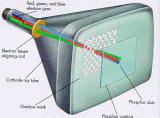
Unions, Manufacturer Win China Trade Dispute May 19, 2004 One year after the IBEW, IUE-CWA and a small domestic TV manufacturer went up against China in a dispute over unfair trade, the U.S. International Trade Commission (ITC) has ruled in the unions favor. The ITC held that U.S. workers and manufacturers were hurt by the import of TVs that are "dumped"-sold below the cost of production-on the domestic market. The action supports a prior finding by the U.S. Department of Commerce in favor of anti-dumping duties of up to 78 percent on more than $276 million worth of 21-inch screen and larger color televisions from China. The ITCs approval was needed before the duties could be imposed. The vote jump-starts the collection of anti-dumping duties averaging 23 percent on the TV imports. Edwin D. Hill, President of the IBEW expressed his approval of the decision. "For once, we have scored a victory for the working people who have lost so much to unfair trade throughout the world," he said. "The imposition of these tariffs is the fair and right thing to do for the U.S. industry and its workers." The ITCs ruling was the result of a petition filed by the IBEW, the International Union of Electronics Workers (IUE-CWA) and Five Rivers Electronic Innovations, a U.S.-based TV assembler in Greeneville, Tennessee. At the hearing on the petition, the unions and Five Rivers argued that Chinese imports had skyrocketed 3,000 percent while U.S. TV production had dropped from 60 percent of capacity to 43 percent. IBEW International Representative Troy Johnson testified during the preliminary hearing last year about the shutdown of the IBEW-represented Sharp plant in Memphis, Tennessee, and the uncertainty facing IBEW members at Toshiba in Lebanon, Tennessee in the face of the Chinese import surge. At the recent final injury hearing, Johnson reported on the recent shutdown of IBEW-represented Thomson TV tube-making and glass plants in Indiana and Ohio. He asked the commissioners to consider the plight of Thomson workers, who will face great difficulty finding new jobs and described the challenges facing communities that have lost a major component of their tax base. Lawyers and executives from big retailers Wal-Mart and Best Buy opposed the petition on behalf of 10 Chinese TV producers. TCL, Chinas second largest TV manufacturer, currently merging with Thomson Inc., arrogantly responded to the Commerce ruling in a statement to the Standard, a Chinese business newspaper. The company said that it would not be affected by the TV ruling because it can simply shift production to countries such as Vietnam to circumvent the duties. International Representative Johnson is hopeful that the ITC ruling will help to secure the jobs of IBEW members at Toshiba at other U.S.-based TV manufacturers, including Sanyo and Five Rivers, but, he states: "The TCL statement tells us that we have an ongoing battle to establish global fair trade that considers the needs of workers and not just the profits of corporations."
|

U.S. MAJORITY DISAPPROVES OF GOVERNMENTS TRADE APPROACHIBEW Members at Thomson Inc. Face Shutdown of TV Tube and Glass PlantsUnfair TV Trade Shows History Repeats Itself
China's Workers --
|